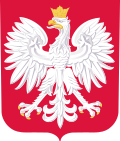 |
|---|
| This article is part of a series on the politics and government of Poland |
|
Related topics |
This is a list of Prime Ministers of Poland.
 |
|---|
| This article is part of a series on the politics and government of Poland |
|
Related topics |
This is a list of Prime Ministers of Poland.
| Portrait | Name (Birth–Death) | Entered office | Left office | Monarch (Reign) | |
|---|---|---|---|---|---|
 | Stanisław Małachowski (1736–1809) | 5 October 1807 | 14 December 1807 | Duke Frederick Augustus I  (1807–1813) | |
 | Ludwik Szymon Gutakowski (1740–1808) | 14 December 1807 | November 1808 | ||
 | Józef Poniatowski (1763–1813) Acting Prime Minister | November 1808 | 25 March 1809 | ||
 | Stanisław Kostka Potocki (1755–1821) | 25 March 1809 | May 1813 | ||
| Portrait | Name (Birth–Death) | Entered office | Left office | |
|---|---|---|---|---|
 | Prince Adam Jerzy Czartoryski (1770–1861) | 3 December 1830 | 15 August 1831 | |
 | Józef Chłopicki (1771–1854) (dictator.) | 5 December 1830 | 17 January 1831 | |
 | General Jan Stefan Krukowiecki (1772–1850) | 17 August 1831 | 7 September 1831 | |
 | Bonawentura Niemojowski (1787–1835) | 8 September 1831 | 23 September 1831 | |
 | Jan Nepomucen Umiński (1778–1851) | 23 September 1831 | 23 September 1831 | |
 | Maciej Rybiński (1784–1874) | 25 September 1831 | 9 October 1831 | |
| Portrait | Name (Birth–Death) | Entered office | Left office | |
|---|---|---|---|---|
 | Gustaw Potworowski (1800–1860) | 20 March 1848 | 9 May 1848 | |
| Portrait | Name (Birth–Death) | Entered office | Left office | |
|---|---|---|---|---|
 | Stefan Bobrowski (1840–1863) | 21 January 1863 | 17 February 1863 | |
 | Ludwik Mierosławski (1814–1878) (dictator.) | 17 February 1863 | 11 March 1863 | |
 | Marian Langiewicz (1827–1887) (dictator.) | 11 March 1863 | 18 March 1863 | |
 | Stefan Bobrowski (1840–1863) | 21 March 1863 | 12 April 1863 | |
 | Agaton Giller (1831–1887) | 12 April 1863 | 23 May 1863 | |
 | Franciszek Dobrowolski (1830–1896) | 23 May 1863 | 9 June 1863 | |
 | Piotr Kobylański (1823–1868) | 9 June 1863 | 10 June 1863 | |
 | Karol Majewski (1833–1897) | 14 June 1863 | 17 September 1863 | |
 | Franciszek Dobrowolski (1830–1896) | 17 September 1863 | 17 October 1863 | |
 | Romuald Traugutt (1826–1864) (dictator.) | 17 October 1863 | 10 April 1864 | |
 | Aleksander Waszkowski (1841–1865) | 12 April 1864 | 19 December 1864 | |
 | Bronisław Brzeziński (1837–1865) | 20 April 1864 | October 1864 | |
Colour key (for political parties):
National-Democratic Party (SDN)
Party of the National Right (SPN)
Independent
The National-Democratic Party was a secret political party created in 1897 in the Russian Partition of Poland by the National League, a conspirational Polish organization active in all three partitions. SND rejected the idea of armed struggle for Poland's sovereignty similar to Polish Positivists. Instead, SDN focused on non-violent opposition and legislative attempts at trying to stop the wholesale Russification and Germanization of the Poles ever since the Polish language was banned in the Russian partition in reprisal for the January Uprising. This however meant also rejecting cooperation with the linguistic and ethnic minorities living in the Empire such as Jews and Ukrainians who did not reciprocate the same sentiment. SDN was founded by Roman Dmowski, Jan Ludwik Popławski, and Zygmunt Balicki, to represent the National Democracy movement at elections. It was a political opponent of the Polish Socialist Party advocating armed resistance.
| Portrait | Name (Birth–Death) | Entered office | Left office | Political party | Cabinet | |
|---|---|---|---|---|---|---|
 | Jan Kucharzewski (1876–1952) | 26 November 1917 | 27 February 1918 | Independent | Kucharzewski | |
 | Antoni Ponikowski (1878–1949) | 27 February 1918 | 4 April 1918 | National-Democratic Party | Ponikowski (provisional) | |
 | Jan Kanty Steczkowski (1862–1929) | 4 April 1918 | 23 October 1918 | Party of the National Right | Steczkowski | |
 | Józef Świeżyński (1868–1948) | 23 October 1918 | 3 November 1918 | National-Democratic Party | Świeżyński | |
 | Władysław Wróblewski (1875–1951) | 3 November 1918 | 14 November 1918 | Independent | Wróblewski (provisional) | |
Colour key (for political parties):
Polish Socialist Party (PPS)
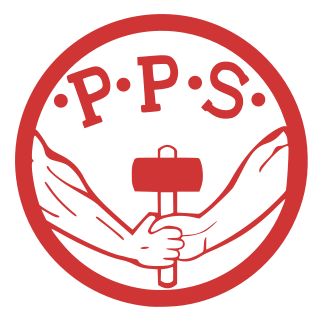
The Polish Socialist Party was a left-wing Polish political party. It was one of the most important parties in Poland from its inception in 1892 until its dissolution in 1948. A party with the same name was established in 1987 but has remained at the margins of Polish politics.
| Portrait | Name (Birth–Death) | Entered office | Left office | Political party | Cabinet | |
|---|---|---|---|---|---|---|
 | Ignacy Daszyński (1866–1936) | 7 November 1918 | 14 November 1918 | Polish Socialist Party | Provisional People's Government of the Republic of Poland | |
Note: Until 11 November, Daszyński was Prime Minister in the Polish People's Republic, based at Lublin, in the territory occupied by Austrian troops. On 11 November, he was invited to form a national government but failed and resigned three days later.
Colour key (for political parties):
Polish Socialist Party (PPS)
Polish People's Party "Piast" (PSL Piast)
Popular National Union (ZLN)
Polish Christian Democratic Party (PSChD)
Party of the National Right (SPN)
Nonpartisan Bloc for Cooperation with the Government (BBWR)
Independent
Polish People's Party "Piast" or Polish Peasant Party "Piast" was a political party from the interwar period of the Second Polish Republic (1913–1931). Piast refers to the medieval Piast dynasty, Poland's founding royal house.
Związek Ludowo-Narodowy was a Polish political party aligned with the National Democracy political movement during the Second Polish Republic, gathering together right-wing politicians with conservative and nationalist opinions.
Polish Christian Democratic Party, was a political party of Polish right wing christian democracy faction existing in the first year of the Second Polish Republic. Its leader and main activist was Wojciech Korfanty.
After the German conquest of Poland, a Polish government-in-exile was formed under the protection of France and Britain. The government was recognized by the United Kingdom and the United States until 5 July 1945, when the Western Allies accepted Stalin's Communist government. By the end of 1946, the government-in-exile had lost recognition by all but a handful of independent nations. Despite this, it continued in London until the election of Lech Wałęsa as President of the Republic of Poland in December 1990.
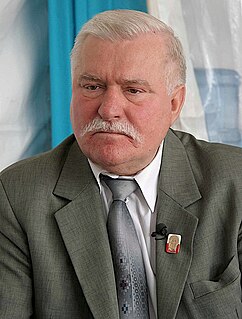
Lech Wałęsa is a Polish retired politician and labour activist. He co-founded and headed Solidarity (Solidarność), the Soviet bloc's first independent trade union, won the Nobel Peace Prize in 1983, and served as President of Poland from 1990 to 1995.
Colour key (for political parties):
People's Party (SL)
Polish Socialist Party (PPS)
Independent

The People's Party was a Polish political party, active from 1931 in the Second Polish Republic. An agrarian populist party, its power base was mostly farmers and rural population.
| Portrait | Name (Birth–Death) | Entered office | Left office | Political party | Cabinet | |
|---|---|---|---|---|---|---|
 | Władysław Sikorski (1881–1943) | 30 September 1939 | 18 July 1940 | Independent | Sikorski II | |
| 18 July 1940 | 4 July 1943(died in office) | Sikorski III | ||||
 | Stanisław Mikołajczyk (1901–1966) | 14 July 1943 | 24 November 1944 | People's Party | Mikołajczyk | |
 | Tomasz Arciszewski (1877–1955) | 29 November 1944 | 5 July 1945 (lost recognition by major Allied powers) | Polish Socialist Party | Arciszewski | |

Tomasz Stefan Arciszewski was a Polish socialist politician, a member of the Polish Socialist Party and the 31st Prime Minister of Poland, 3rd Prime Minister of the Polish government-in-exile in London from 1944 to 1947, presiding over the period when the government lost the recognition of the Western powers.
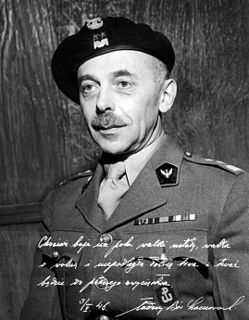
General Tadeusz Komorowski, better known by the name Bór-Komorowski was a Polish military leader. He was appointed commander in chief a day before the capitulation of the Warsaw uprising and following World War II, 32nd Prime Minister of Poland, 3rd Polish government-in-exile in London.
An independent or nonpartisan politician is an individual politician not affiliated with any political party. There are numerous reasons why someone may stand for office as an independent.
In 1954, one group within the government-in-exile opposed the continuation of August Zaleski as President of the government-in-exile beyond the end of his seven-year term. They established the Council of National Unity, vested the powers of the President in the Rada Trzech (three-man council), and appointed their own government, the Executive for National Unity. After the death of Zaleski in 1972, the Council of National Unity dissolved and ceded its powers to Zaleski's successor Stanisław Ostrowski.
Colour key (for political parties):
Polish Socialist Party (PPS)
Polish United Workers' Party (PZPR)
Solidarity Citizens' Committee (KO‘S’)
| Portrait | Name (Birth–Death) | Entered office | Left office | Political party | Cabinet | |
|---|---|---|---|---|---|---|
 | Edward Osóbka-Morawski (1909–1997) | 22 July 1944 | 31 December 1944 | Polish Socialist Party | Polish Committee of National Liberation | |
| 31 December 1944 | 28 June 1945 | Provisional Government of the Republic of Poland | ||||
| 28 June 1945 | 6 February 1947 | Provisional Government of National Unity | ||||
 | Józef Cyrankiewicz (1911–1989) | 6 February 1947 | 20 November 1952 | Polish Socialist Party | Cyrankiewicz I | |
| Polish United Workers' Party (from December 1948) | ||||||
 | Bolesław Bierut (1892–1956) | 20 November 1952 | 18 March 1954 | Polish United Workers' Party | Bierut | |
 | Józef Cyrankiewicz (1911–1989) | 18 March 1954 | 15 May 1961 | Polish United Workers' Party | Cyrankiewicz II | |
| 18 May 1961 | 24 June 1965 | Cyrankiewicz III | ||||
| 25 June 1965 | 27 June 1969 | Cyrankiewicz IV | ||||
| 28 June 1969 | 23 December 1970 | Cyrankiewicz V | ||||
 | Piotr Jaroszewicz (1909–1992) | 23 December 1970 | 28 March 1972 | Polish United Workers' Party | (Cyrankiewicz V) | |
| 28 March 1972 | 25 March 1976 | Jaroszewicz I | ||||
| 27 March 1976 | 18 February 1980 | Jaroszewicz II | ||||
 | Edward Babiuch (born 1927) | 18 February 1980 | 24 August 1980 | Polish United Workers' Party | Babiuch | |
 | Józef Pińkowski (1929–2000) | 24 August 1980 | 11 February 1981 | Polish United Workers' Party | Pińkowski | |
 | Wojciech Jaruzelski (1923–2014) | 11 February 1981 | 6 November 1985 | Polish United Workers' Party | Jaruzelski | |
 | Zbigniew Messner (1929–2014) | 6 November 1985 | 27 September 1988 | Polish United Workers' Party | Messner | |
 | Mieczysław Rakowski (1926–2008) | 27 September 1988 | 2 August 1989 | Polish United Workers' Party | — | |
 | Czesław Kiszczak (1925–2015) (lost vote of confidence.) | 2 August 1989 | 24 August 1989 | Polish United Workers' Party | Kiszczak | |
 | Tadeusz Mazowiecki (1927–2013) (during democratic transition.) | 24 August 1989 | 31 December 1989 (People's Republic abolished.) | Solidarity Citizens' Committee | Mazowiecki | |
Colour key (for political parties):
Democratic Union (UD)
Centre Agreement (PC)
Liberal Democratic Congress (KLD)
Polish People's Party (PSL)
Social Democracy (SdRP) / Democratic Left Alliance (SLD)
Solidarity Electoral Action (AWS)
Law and Justice (PiS)
Civic Platform (PO)
| Portrait | Name (Birth–Death) | Designated Took office Voted of confidence | Left office R.: Resigned Dis.: Dismissed N.C.: Voted of no-confidence | Political party | Cabinet | Sejm (Election) | |
|---|---|---|---|---|---|---|---|
 | Tadeusz Mazowiecki (1927–2013) | 20 August 1989 24 August 1989 12 September 1989 | R. 25 November 1990 4 January 1991 | Solidarity Citizens' Committee (KO‘S’) until 1990 Democratic Union (UD) from 1990 | Mazowiecki KO‘S’–ZSL–PZPR–SD | Contract (1989) | |
 | Jan Krzysztof Bielecki (born 1951) | 4 January 1991 4 January 1991 12 January 1991 | R. 5 December 1991 6 December 1991 | Liberal Democratic Congress (KLD) | Bielecki KLD–ZChN–PC–SD | ||
 | Jan Olszewski (1930–2019) | 6 December 1991 6 December 1991 23 December 1991 | Dis. 5 June 1992 5 June 1992 | Centre Agreement (PC) | Olszewski PC–ZChN–PSL.PL | I (1991) | |
 | Waldemar Pawlak (born 1959) | 5 June 1992 5 June 1992 (no confidence vote.) | R. 7 July 1992 11 July 1992 | Polish People's Party (PSL) | Pawlak I PSL | ||
 | Hanna Suchocka (born 1946) | 10 July 1992 11 July 1992 11 July 1992 | 28 May 1993 26 October 1993 | Democratic Union (UD) | Suchocka UD–KLD–ZChN–PChD– PPPP–PSL.PL | ||
 | Waldemar Pawlak (born 1959) | 18 October 1993 26 October 1993 10 November 1993 | 1 March 1995 7 March 1995 | Polish People's Party (PSL) | Pawlak II SLD–PSL–BBWR | II (1993) | |
 | Józef Oleksy (1946–2015) | 1 March 1995 7 March 1995 4 March 1995 | 26 January 1996 7 February 1996 | Social Democracy (SdRP) | Oleksy SLD–PSL | ||
 | Włodzimierz Cimoszewicz (born 1950) | 7 February 1996 7 February 1996 15 February 1996 | R. 17 October 1997 31 October 1997 | Social Democracy (SdRP) | Cimoszewicz SLD–PSL | ||
 | Jerzy Buzek (born 1940) | 17 October 1997 31 October 1997 11 November 1997 | Dis. 19 October 2001 19 October 2001 | Solidarity Electoral Action (AWS) | Buzek AWS–UW | III (1997) | |
 | Leszek Miller (born 1946) | 4 October 2001 19 October 2001 26 October 2001 & 13 June 2003 | R. 2 May 2004 2 May 2004 | Democratic Left Alliance (SLD) | Miller SLD–UP–PSL | IV (2001) | |
 | Marek Belka (born 1952) | 2 May 2004 2 May 2004 14 May 2004 (rejected.) | N.C. 14 May 2004 11 June 2004 | Democratic Left Alliance (SLD) | Belka I SLD–UP | ||
| 11 June 2004 11 June 2004 24 June 2004 & 15 October 2004 | R. 5 May 2005 Dis. 19 October 2005 31 October 2005 | Belka II SLD–UP | |||||
 | Kazimierz Marcinkiewicz (born 1959) | 19 October 2005 31 October 2005 10 November 2005 | R. 10 July 2006 14 July 2006 | Law and Justice (PiS) | Marcinkiewicz PiS–SRP–LPR | V (2005) | |
 | Jarosław Kaczyński (born 1949) | 10 July 2006 14 July 2006 19 July 2006 | R. 5 November 2007 16 November 2007 | Law and Justice (PiS) | Kaczyński PiS–SRP–LPR | ||
 | Donald Tusk (born 1957) | 9 November 2007 16 November 2007 24 November 2007 | R. 8 November 2011 18 November 2011 | Civic Platform (PO) | Tusk I PO–PSL | VI (2007) | |
| 8 November 2011 18 November 2011 19 November 2011 | R. 11 September 2014 22 September 2014 | Tusk II PO–PSL | VII (2011) | ||||
 | Ewa Kopacz (born 1956) | 15 September 2014 22 September 2014 1 October 2014 | R. 12 November 2015 16 November 2015 | Civic Platform (PO) | Kopacz PO–PSL | ||
 | Beata Szydło (born 1963) | 13 November 2015 16 November 2015 18 November 2015 | R. 8 December 2017 11 December 2017 | Law and Justice (PiS) | Szydło PiS | VIII (2015) | |
 | Mateusz Morawiecki (born 1968) | 8 December 2017 11 December 2017 12 December 2017 | Incumbent | Law and Justice (PiS) | Morawiecki PiS | ||
1 Invited to form a government by the President, but failed to form a government and resigned.

Democratic Left Alliance is a social-democratic political party in Poland. It was formed in 1991 as an electoral alliance of centre-left parties, and became a single party on 15 April 1999. The SLD has no representation in the Sejm or Senate following the 2015 parliamentary election. The party is a member of the Party of European Socialists and Progressive Alliance.
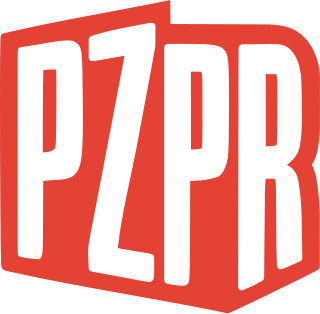
The Polish United Workers' Party was the Communist party which governed the Polish People's Republic from 1948 to 1989. Ideologically it was based on the theories of Marxism-Leninism. It also controlled the armed forces, the Polish People's Army.
Sanation was a Polish political movement that was created in the interwar period, prior to Józef Piłsudski's May 1926 Coup d'État, and came to power in the wake of that coup. In 1928 its political activists would go on to form the Nonpartisan Bloc for Cooperation with the Government (BBWR).

The Polish Workers' Party was a communist party in Poland from 1942 to 1948. It was founded as a reconstitution of the Communist Party of Poland (KPP) and merged with the Polish Socialist Party (PPS) in 1948 to form the Polish United Workers' Party (PZPR). From the end of World War II the PPR ruled Poland, with the Soviet Union exercising overall control. During the PPR years, the conspiratorial as well as legally permitted centers of opposition activity were largely eliminated, while the communist system was gradually established in the country.
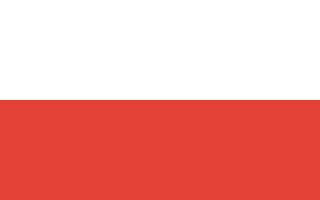
The Polish government-in-exile, formally known as the Government of the Republic of Poland in exile, was the government in exile of Poland formed in the aftermath of the Invasion of Poland of September 1939, and the subsequent occupation of Poland by Germany and the Soviet Union, which brought to an end the Second Polish Republic.

Janusz Jędrzejewicz was a Polish politician and educator, a leader of the Sanacja political group, and 24th Prime Minister of Poland from 1933 to 1934.
The Council of Three was a collegial body created by the Polish Government in Exile in 1954 with prerogatives of the President of Poland. It consisted of three members of the government chosen by the Rada Jedności Narodowej, a rump parliament in exile.
The Nonpartisan Bloc for Cooperation with the Government was a "non-political" organization in the interwar Second Polish Republic, in 1928–35. It was closely affiliated with Józef Piłsudski and his Sanation movement. Its major activists included Walery Sławek, Kazimierz Bartel, Kazimierz Świtalski, Aleksander Prystor, Józef Beck, Janusz Jędrzejewicz, Wacław Jędrzejewicz, Adam Koc, Leon Kozłowski, Ignacy Matuszewski, Bogusław Miedziński, Bronisław Pieracki, Adam Skwarczyński, and Janusz Franciszek Radziwiłł.
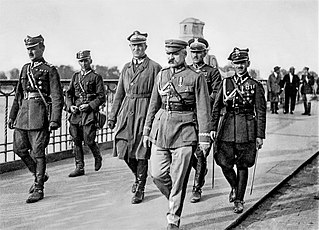
The May Coup was a coup d'état carried out in Poland by Marshal Józef Piłsudski between 12 and 14 May 1926. The coup overthrew the government of President Stanisław Wojciechowski and Prime Minister Wincenty Witos. A new government was installed, headed by Lwów Polytechnic Professor Kazimierz Bartel. The events were partly inspired by the need for extraordinary measures in the face of newly emerging threats to the stability of Poland's independence by Piłsudski's own assessment of the foreign treaties signed by Weimar Germany with France in 1925 and with the Soviet Russia in April 1926, to which Poland's representatives had not been invited.

Ignacy Ewaryst Daszyński was a Polish socialist politician, journalist, and very briefly Prime Minister of the Second Polish Republic's first government, formed in Lublin in 1918.

The Polish Committee of National Liberation, also known as the Lublin Committee, was an executive governing authority established by the communists in Poland at the later stage of World War II. It was officially proclaimed on 22 July 1944 in Chełm, installed on 26 July in Lublin and placed formally under the direction of the State National Council. The PKWN was a provisional entity functioning in opposition to the Polish government-in-exile, the internationally recognized government of Poland. The PKWN exercised control over Polish territory retaken from Nazi Germany by the Soviet Red Army and the Polish People's Army. It was sponsored and controlled by the Soviet Union and dominated by Polish communists.
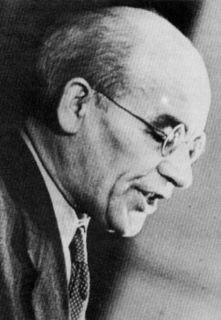
Krajowa Rada Narodowa in Polish was a parliament-like political body created during the later period of World War II in German-occupied Warsaw. It was intended as a communist-controlled center of authority, challenging organs of the mainstream Polish Underground State. The existence of the KRN was later accepted by the Soviet Union and the council became to a large extent subjugated and controlled by the Soviets.

Antoni Pająk was a Polish socialist politician, who served as 39th Prime Minister of Poland and 9th Prime Minister in exile for nearly ten years (1955-1965).

Jerzy Hryniewski was a Polish politician, who is best known for serving as 36th Prime Minister of Poland and 6th Prime Minister of the Polish Government in Exile from 18 January to 13 May 1954. He was also active in Polish politics during Second Republic.

Alfred Urbański was a Polish politician, a member of the Polish Socialist Party (PPS), primarily known for his political activities within the Polish Government in Exile.

Adam Ciołkosz was a Polish scout, soldier, publicist and politician, who was one of the most important leaders of the Polish Socialist Party, both in the Second Polish Republic and in exile during and after World War II.